As his 10 top competitors were in Houston prepping for a big night on national television last week, Democratic presidential candidate and Montana Gov. Steve Bullock was 900 miles (1,450 kilometers) north in a suburban Des Moines brewpub.
The governor wasn't drowning his sorrows over failing to qualify for the primary debate, but he wasn't exactly hiding his disappointment from the crowd that gathered to hear his pitch on a Thursday afternoon. "There may be one place I'd rather be than in Clive tonight," he acknowledged.
The governor's failure to break into the top 10 — getting beat out by a tech entrepreneur and the mayor of South Bend, Indiana — may have marked a moment for presidential politics. Being a governor who promised bipartisan appeal and executive experience used to be a profile for primary success. Thanks to Jimmy Carter, Ronald Reagan and Bill Clinton, the can-do, outsider governor has been a storied character in presidential politics. Today, that model is looking increasingly outdated.
All three governors who launched bids this year struggled to build national profiles and donor bases needed to thrive. They found themselves immediately competing against multiple candidates with celebrity status, name recognition and well-known positions on national issues. Their campaigns in Iowa and New Hampshire haven't caused a ripple.
Bullock is the last governor standing. Washington Gov. Jay Inslee bailed last month to run for reelection. Former Colorado Gov. John Hickenlooper retreated to a Senate race. Bullock is also under pressure to run for Senate, but he says he's not interested.
"Just about every governor in the country thinks that they can be the next Jimmy Carter or Bill Clinton, but presidential politics has changed a lot since then," said Alex Conant, who served as communications director for Minnesota Republican Gov. Tim Pawlenty's failed 2012 presidential campaign. "It's really hard for governors to raise the resources and build the sort of national name ID that is required to build a successful presidential campaign in the modern era. ... Governors bring executive experience and a track record of getting things done, but there's not a lot of evidence that voters are looking for that."
Democratic voters maintain one of their top priorities is to defeat President Donald Trump, but there's a deep divide over the best way to do it. Bullock, an amiable, cowboy-booted former state attorney general, is making his pitch to primary voters who think the best path is to win over moderates. He touts his record of winning in a state that voted for Trump by double digits. He argues he can work with Republicans.
"The core of the word progressive is progress," Bullock said in an interview. "I haven't been able to just give speeches. I've actually had to get stuff done."
His problem is that he's not the only one carrying that message, said Joe Trippi, a Democratic strategist who managed former Vermont Gov. Howard Dean's 2004 presidential campaign. Bullock's biggest challenge is former Vice President Joe Biden, a well-known candidate who can also show he's pragmatic, can work across party lines and has administrative experience running a government, Trippi said.
"There's a bigger player in the race that's sort of dominating that area," he said.
The large primary field and Trump's ability to commandeer national attention for days are making it hard for any candidate to sustain attention. That's complicated by the Democratic National Committee requiring candidates to have 130,000 unique donors and at least 2% in four approved polls to qualify for the September and October debate stage.
Bullock has been critical of the rules, saying they create a "Hunger Games"-style competition and force candidates to spend $60 on social media ads in order to earn a $1 donation. After he failed to qualify for the September debate, his campaign released a memo to donors reminding them that it's early and that polls in past years eventually changed.
What's clear is the DNC's debate rules have forced candidates to spend time and money fundraising and introducing themselves around the country instead of hunkering down in Iowa, the first state to weigh in on the primary field.
Jimmy Carter, a former Georgia governor, staked his fortunes on Iowa before the 1976 Democratic presidential caucuses, camping out in the state to sell himself as a proud Washington outsider. His second-place showing, behind uncommitted, transformed him from a longshot — worthy of a "Jimmy who?" headline — to top tier and set him on a path to the White House. In 1992, Arkansas Gov. Bill Clinton lost Iowa to native son Tom Harkin but used a second-place showing in New Hampshire to come back and build momentum behind his bid.
That model isn't necessarily dead, "but it's very hard" to win if a candidate can't make the debate and is banking only on grassroots campaigning in early states, said former Virginia Gov. Terry McAuliffe, who considered a 2020 presidential run but decided against it.
McAuliffe said because governors hold an executive office, it's harder for them to skip on their day job and spend time in Iowa, whereas a missed vote or two in a log-jammed Congress isn't as problematic for senators.
"A sitting governor has to be in their state. You are actually running a state," McAuliffe said. "You've got to deal with natural emergencies. You've got to deal with your legislature. ... You can't be out of your state that much."
McAuliffe said governors might have more luck in future years, but Democrats' overwhelming concern about defeating the president and the crowded field has scrambled the game.
To try to hang on, Bullock has been making more frequent appearances on cable news, and his campaign has also dabbled with viral, buzzy content to lure in small donors. After Trump proposed that the U.S. buy Greenland, Bullock's campaign quickly released a website mocking the idea and urging people to donate a dollar.
Bullock said that even if he doesn't make the debate stage, he's planning to hang on until the Iowa caucuses in February.
"We still have to recognize we're still six months before the first voters express their preference, so we've got a long way to go," he said.
Associated Press writers Alexandra Jaffe in Des Moines, Iowa, and Scott McFetridge in Clive, Iowa, contributed to this report.
VENICE, Italy (AP) — Under the gaze of the world’s media, the fragile lagoon city of Venice launched a pilot program Thursday to charge day-trippers a 5-euro ($5.35) entry fee that authorities hope will discourage visitors from arriving on peak days and make the city more livable for its dwindling residents.
Visitors arriving at Venice's main train station were greeted with large signs listing the 29 dates through July of the plan's test phase that also designated separate entrances for tourists, and residents, students and workers.
“We need to find a new balance between the tourists and residents,’’ said Simone Venturini, the city’s top tourism official. “We need to safeguard the spaces of the residents, of course, and we need to discourage the arrival of day-trippers on some particular days.”
Not all residents, however, are persuaded of the efficacy of the new system in dissuading mass tourism, insisting that only a resurgence in the population will restore balance to a city where narrow alleyways and water buses are often clogged with tourists.
Hundreds of Venetians protested against the program, marching festively though the city's main bus terminal behind banners reading “No to Tickets, Yes to Services and Housing.” Protesters scuffled briefly with police with riot gear who blocked them from entering the city, before changing course and entering over another bridge escorted by plainclothes police officers. The demonstration wrapped up peacefully in a piazza.
Tourists arriving at the main station encountered almost as many journalists as stewards on hand to politely guide anyone unaware of the new requirements through the process of downloading the QR code to pay the fee.
Arianna Cecilia, a tourist from Rome visiting Venice for the first time, said she thought it was “strange” to have to pay to enter a city in her native country, and be funneled through separate entrance ways for tourists. She and her boyfriend were staying in nearby Treviso, and so downloaded the QR code as required. But she was still caught off-guard while soaking in her first view ever of Venice's canals by the sight of the entrance signs and her boyfriend telling her to get out the ticket.
On the other side of the entrance ways, workers in yellow vests carried out random checks at the train station. Transgressors face fines of 50 to 300 euros ($53 to $320), but officials said “common sense” was being applied for the launch.
The requirement applies only for people arriving between 8:30 a.m. and 4 p.m. Outside of those hours, access is free and unchecked.
Venice has long suffered under the pressure of overtourism, and officials hope that the pilot project can help provide more exact figures to better manage the phenomenon.
The city can track the number of hotel visitors, which last year numbered 4.6 million and is down 16% from pre-pandemic highs. But the number of day visitors, which make up the majority of the crowds in Venice, could only be estimated until recently.
A Smart Control Room set up during the pandemic has been tracking arrivals from cellphone data, roughly confirming pre-pandemic estimates of 25 million to 30 million arrivals a year, said Michele Zuin, the city’s top economic official. That includes both day-trippers and overnight guests.
But Zuin said the data is incomplete.
“It’s clear we will get more reliable data from the contribution” being paid by day-trippers, he said.
Venturini said the city is strained when the number of day-trippers reaches 30,000 to 40,000. On peak days, local police set up one-way traffic for pedestrians to keep the crowds moving.
Residents opposing the day-tripper tax insist that the solution to Venice's woes are to boost the resident population and the services they need, limiting short-term rentals to make available more housing and attract families back from the mainland.
Last year, Venice passed a telling milestone when the number of tourist beds exceeded for the first time the number of official residents, which is now below 50,000 in the historic center with its picturesque canals.
“Putting a ticket to enter a city will not decrease not even by one single unit the number of visitors that are coming,’’ said Tommaso Cacciari, an activist who organized a protest Thursday against the measure.
“You pay a ticket to take the metro, to go to a museum, an amusement park. You don’t pay a ticket to enter a city. This is the last symbolic step of a project of an idea of this municipal administration to kick residents out of Venice,” he said.
Venice Mayor Luigi Brugnaro declared the launch day, coinciding with an Italian holiday, a success, registering 15,700 paying visitors, 50% more than anticipated.
More than 97,000 others had downloaded a QR code denoting an exemption, including to work in Venice or as a resident of the Veneto region. Hotels in Venice, including in mainland districts like Marghera or Mestre, provided a QR code for visitors to attest to their stay, which includes a hotel tax — accounting for 40,000 of those.
Venturini, the tourist official, said that interest in Venice’s pilot program has been keen from other places suffering from mass tourism, including other Italian art cities, and municipalities abroad such as Barcelona, Spain, and Amsterdam.
But Marina Rodino, who has lived in Venice for 30 years, doesn't see the fee as the cure-all. Neighboring apartments in her residential building near the famed Rialto Bridge once inhabited by families are now short-term apartment rentals.
The corner butcher shop closed. Yet she noted that the new entrance fee requirement will still allow young people to flood the city in the evening for the traditional aperitivo, which can grow rowdy.
She was passing out mock European Union passports for “Venice, Open City,” underlining the irony of the new system, and challenging its legal standing with citations from the Italian Constitution guaranteeing its citizens the right to “move or reside freely in any part of the national territory."
“This is not a natural oasis. This is not a museum. It is not Pompeii. It is a city, where we need to fight so the houses are inhabited by families, and stores reopen. That is what would counter this wild tourism,’’ Rodino said.
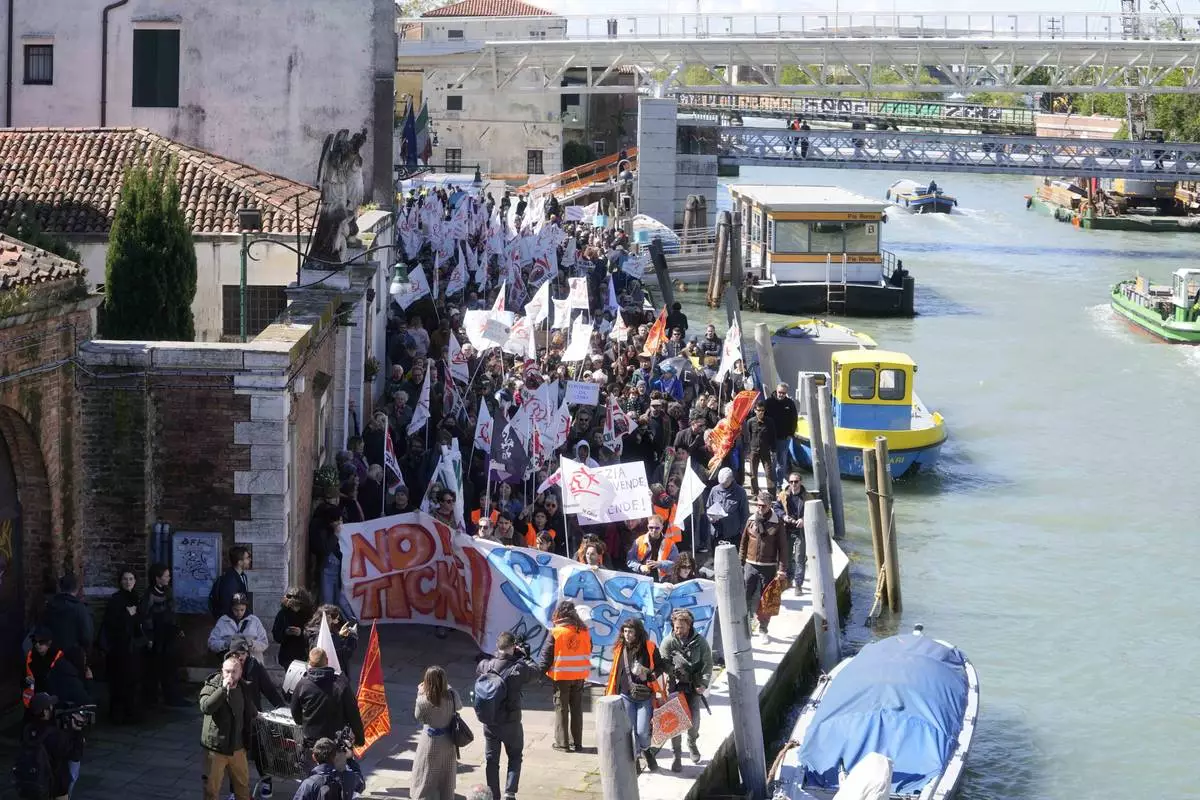
Citizens and activists stage a protest against Venice Tax Fee in Venice, Italy, Thursday, April 25, 2024. The fragile lagoon city of Venice begins a pilot program Thursday to charge daytrippers a 5 euro entry fee that authorities hope will discourage tourists from arriving on peak days. The daytripper tax is being tested on 29 days through July, mostly weekends and holidays starting with Italy's Liberation Day holiday Thursday. Officials expect some 10,000 people will pay the fee to access the city on the first day, downloading a QR code to prove their payment, while another 70,000 will receive exceptions, for example, because they work in Venice or live in the Veneto region. (AP Photo/Luca Bruno)

A citizen shows a ticket with the writing 'Veniceland' during a protest against Venice Tax Fee in Venice, Italy, Thursday, April 25, 2024. The fragile lagoon city of Venice begins a pilot program Thursday to charge daytrippers a 5 euro entry fee that authorities hope will discourage tourists from arriving on peak days. The daytripper tax is being tested on 29 days through July, mostly weekends and holidays starting with Italy's Liberation Day holiday Thursday. Officials expect some 10,000 people will pay the fee to access the city on the first day, downloading a QR code to prove their payment, while another 70,000 will receive exceptions, for example, because they work in Venice or live in the Veneto region. (AP Photo/Luca Bruno)
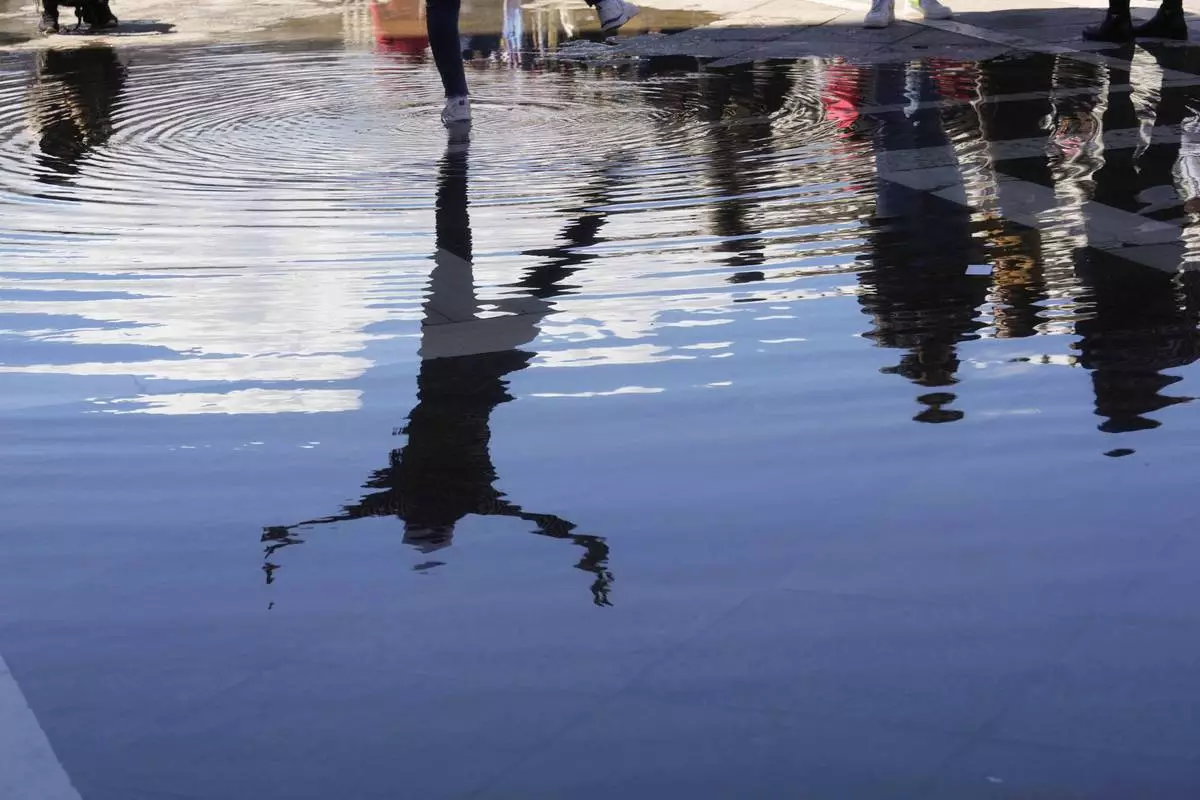
Tourists enjoy a sunny day at St.Mark square in Venice, Italy, Thursday, April 25, 2024. The fragile lagoon city of Venice begins a pilot program Thursday to charge daytrippers a 5 euro entry fee that authorities hope will discourage tourists from arriving on peak days. (AP Photo/Luca Bruno)
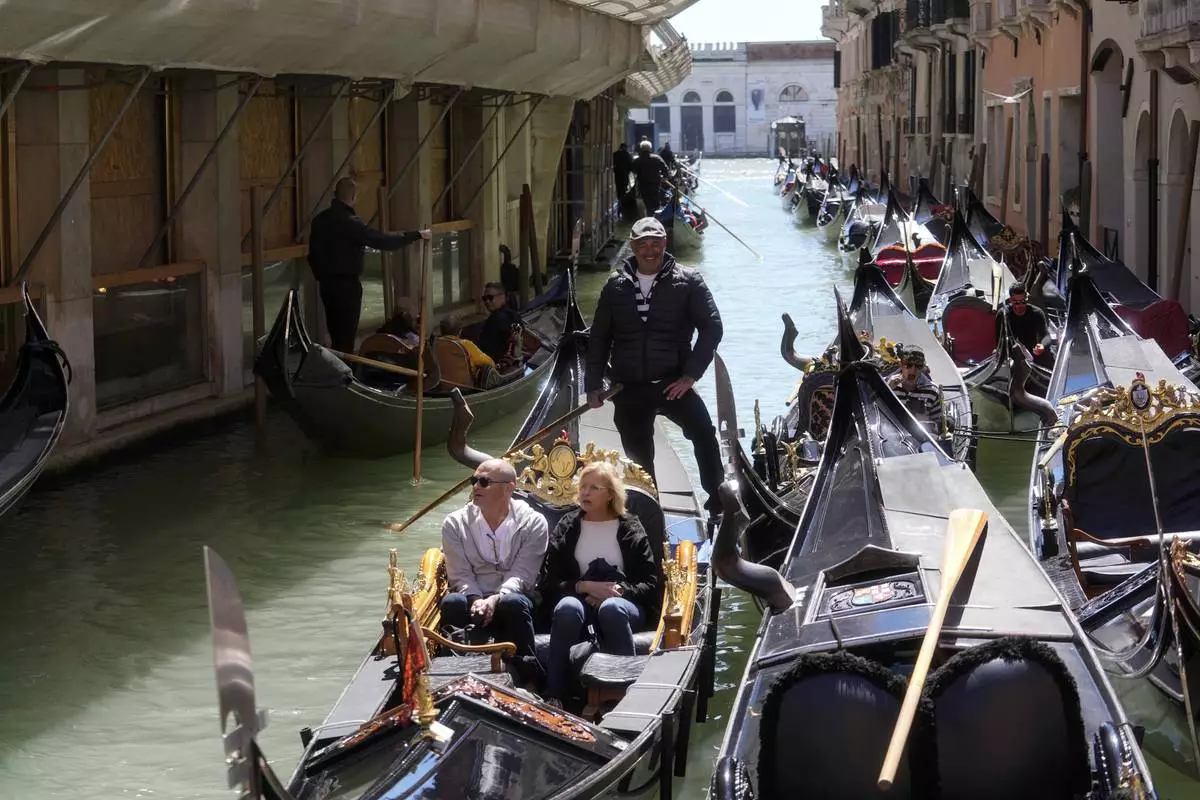
Tourists enjoy a ride on gondolas in Venice, Italy, Thursday, April 25, 2024. The fragile lagoon city of Venice begins a pilot program Thursday to charge daytrippers a 5 euro entry fee that authorities hope will discourage tourists from arriving on peak days. (AP Photo/Luca Bruno)

Citizens and activists confront police during a demonstration against Venice Tax Fee in Venice, Italy, Thursday, April 25, 2024. The fragile lagoon city of Venice begins a pilot program Thursday to charge daytrippers a 5 euro entry fee that authorities hope will discourage tourists from arriving on peak days. The daytripper tax is being tested on 29 days through July, mostly weekends and holidays starting with Italy's Liberation Day holiday Thursday. Officials expect some 10,000 people will pay the fee to access the city on the first day, downloading a QR code to prove their payment, while another 70,000 will receive exceptions, for example, because they work in Venice or live in the Veneto region. (AP Photo/Luca Bruno)
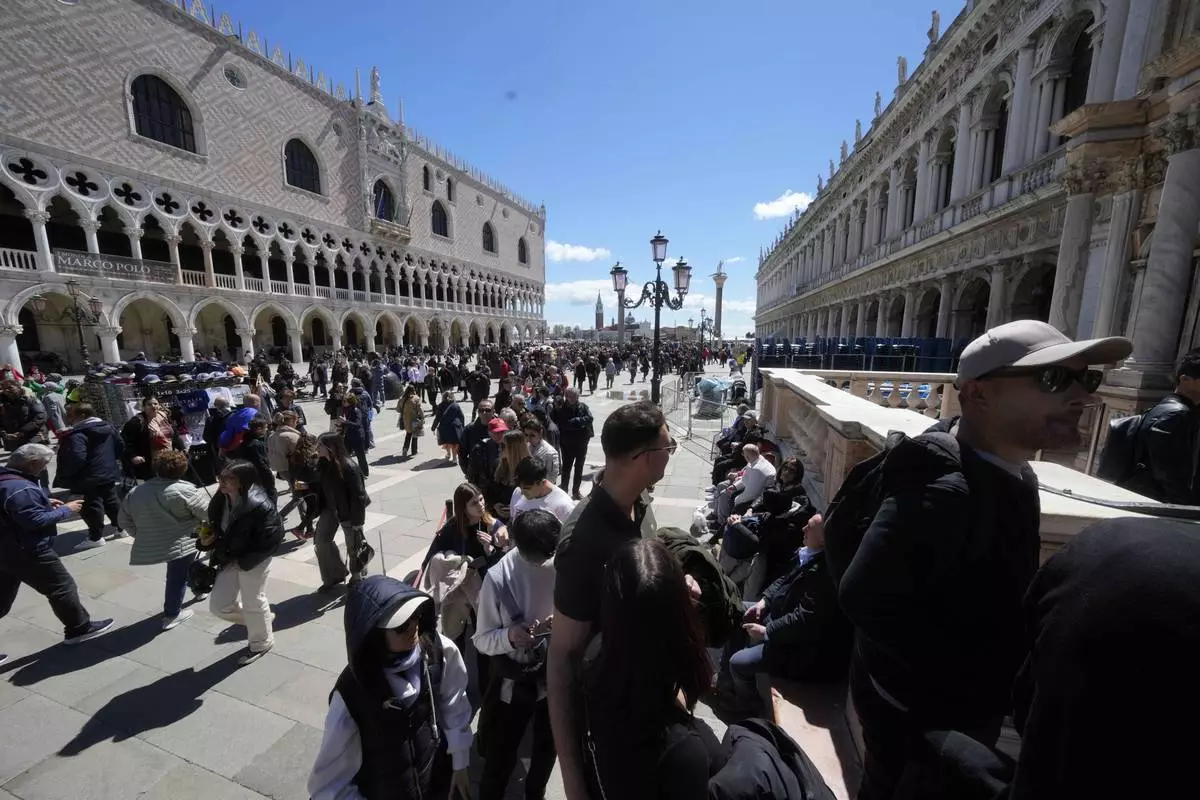
Tourists line up to enter at the at St.Mark bell tower in Venice, Italy, Thursday, April 25, 2024. The fragile lagoon city of Venice begins a pilot program Thursday to charge daytrippers a 5 euro entry fee that authorities hope will discourage tourists from arriving on peak days. (AP Photo/Luca Bruno)
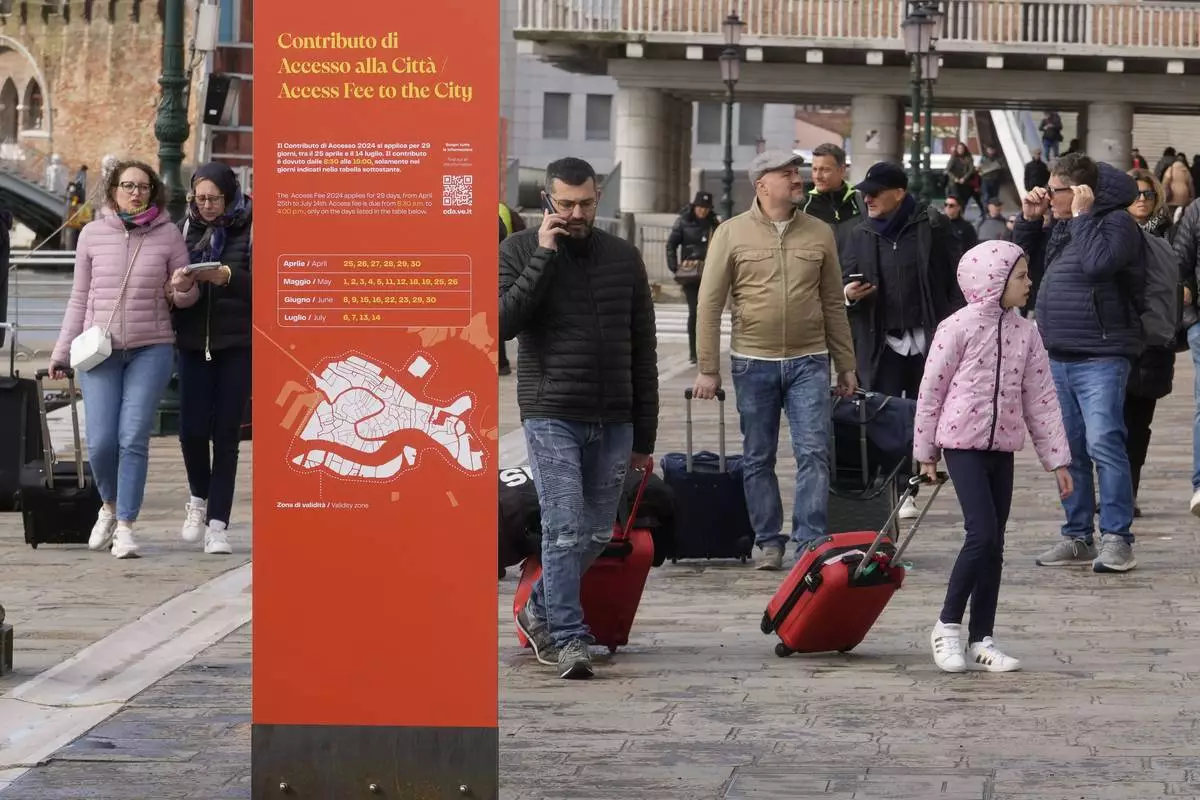
Tourists arrive in Venice, Italy, Thursday, April 25, 2024. The fragile lagoon city of Venice begins a pilot program Thursday to charge daytrippers a 5 euro entry fee that authorities hope will discourage tourists from arriving on peak days. The daytripper tax is being tested on 29 days through July, mostly weekends and holidays starting with Italy's Liberation Day holiday Thursday. Officials expect some 10,000 people will pay the fee to access the city on the first day, downloading a QR code to prove their payment, while another 70,000 will receive exceptions, for example, because they work in Venice or live in the Veneto region. (AP Photo/Luca Bruno)
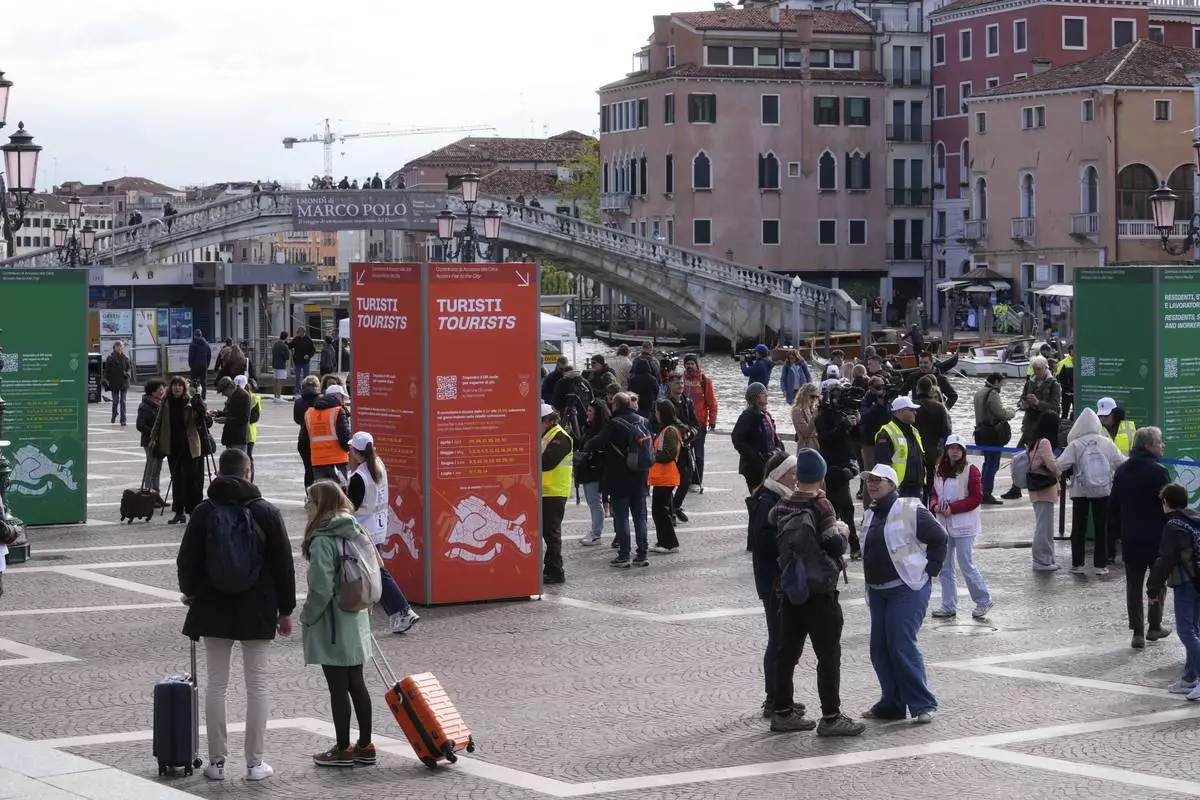
Stewards check tourists QR code access outside the main train station in Venice, Italy, Thursday, April 25, 2024. The fragile lagoon city of Venice begins a pilot program Thursday to charge daytrippers a 5 euro entry fee that authorities hope will discourage tourists from arriving on peak days. The daytripper tax is being tested on 29 days through July, mostly weekends and holidays starting with Italy's Liberation Day holiday Thursday. Officials expect some 10,000 people will pay the fee to access the city on the first day, downloading a QR code to prove their payment, while another 70,000 will receive exceptions, for example, because they work in Venice or live in the Veneto region. (AP Photo/Luca Bruno)
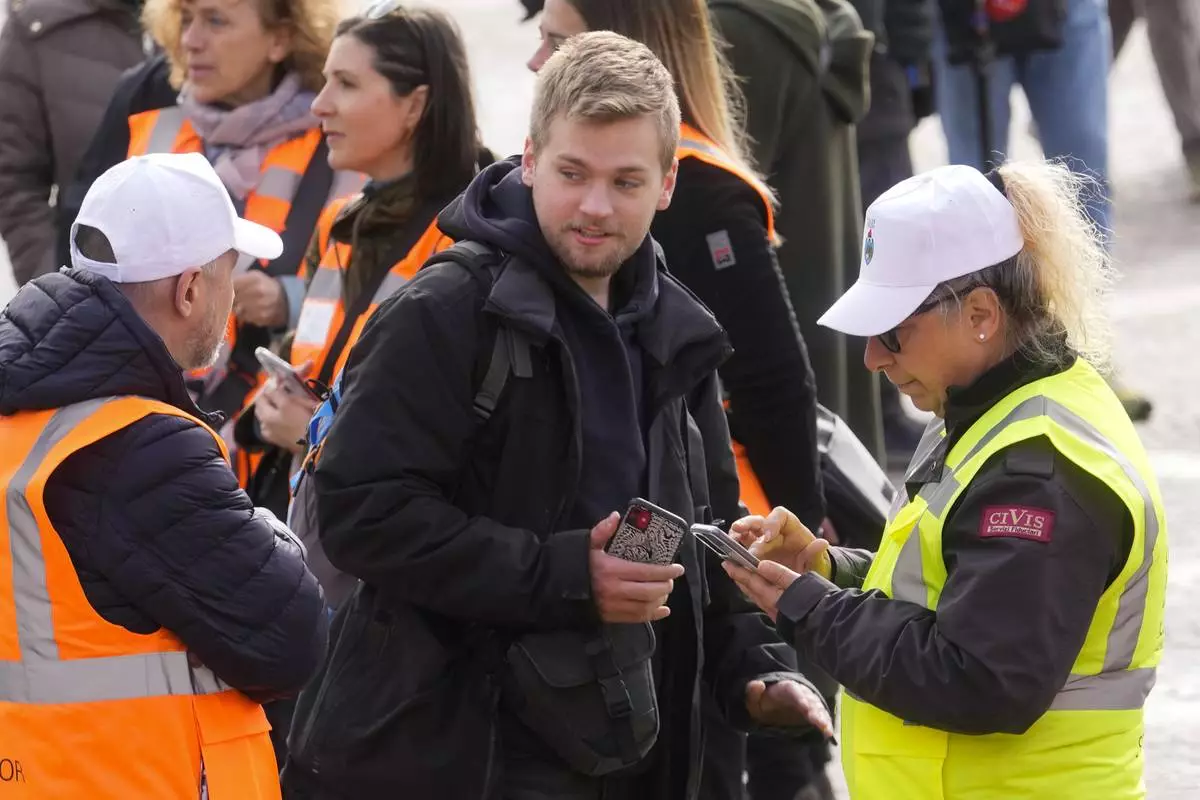
Stewards check a tourist QR code access outside the main train station in Venice, Italy, Thursday, April 25, 2024. The fragile lagoon city of Venice begins a pilot program Thursday to charge daytrippers a 5 euro entry fee that authorities hope will discourage tourists from arriving on peak days. The daytripper tax is being tested on 29 days through July, mostly weekends and holidays starting with Italy's Liberation Day holiday Thursday. Officials expect some 10,000 people will pay the fee to access the city on the first day, downloading a QR code to prove their payment, while another 70,000 will receive exceptions, for example, because they work in Venice or live in the Veneto region. (AP Photo/Luca Bruno)
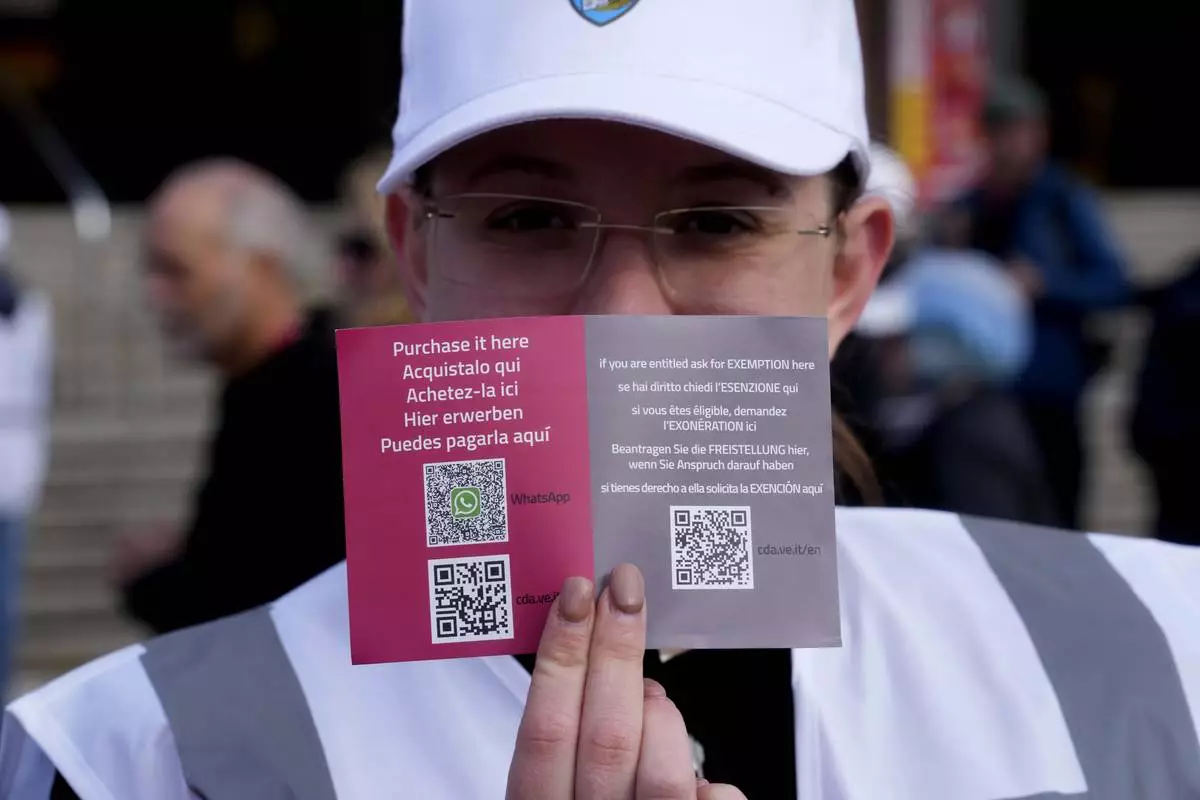
A steward shows the QR code access outside the main train station in Venice, Italy, Thursday, April 25, 2024. The fragile lagoon city of Venice begins a pilot program Thursday to charge daytrippers a 5 euro entry fee that authorities hope will discourage tourists from arriving on peak days. The daytripper tax is being tested on 29 days through July, mostly weekends and holidays starting with Italy's Liberation Day holiday Thursday. Officials expect some 10,000 people will pay the fee to access the city on the first day, downloading a QR code to prove their payment, while another 70,000 will receive exceptions, for example, because they work in Venice or live in the Veneto region. (AP Photo/Luca Bruno)
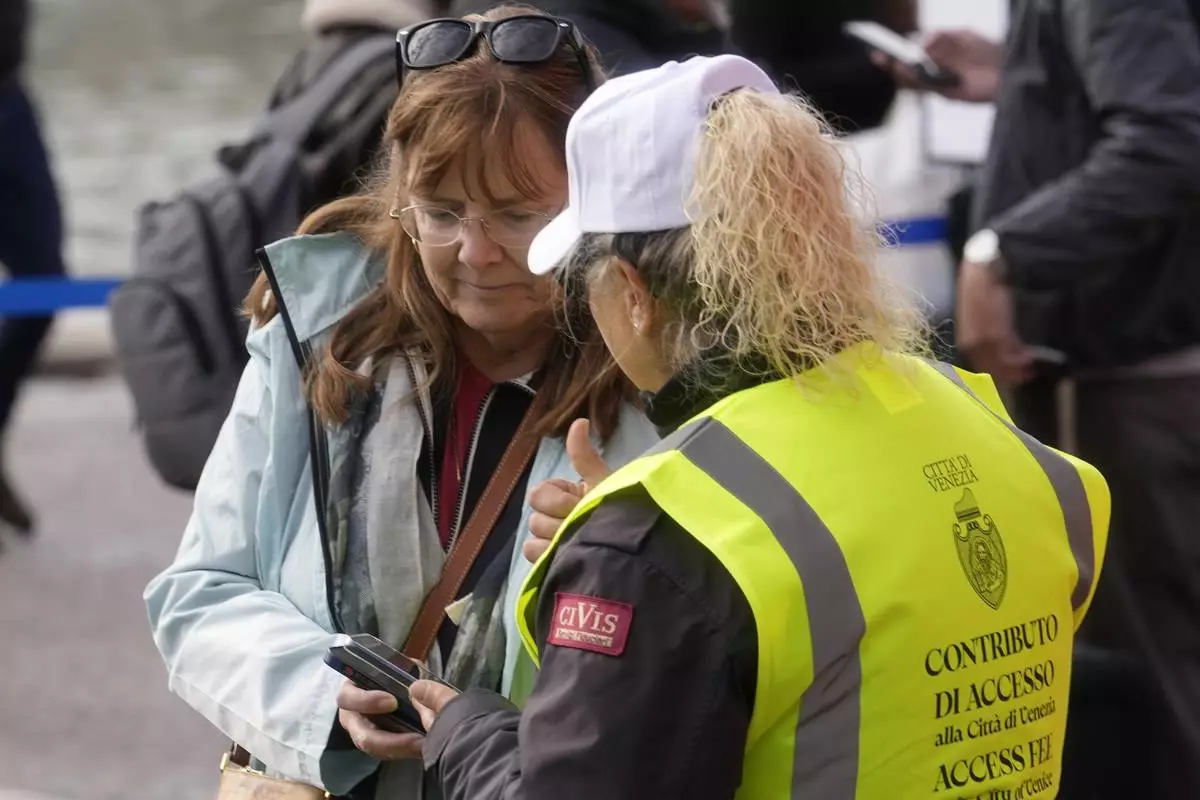
A steward checks a tourist QR code access outside the main train station in Venice, Italy, Thursday, April 25, 2024. The fragile lagoon city of Venice begins a pilot program Thursday to charge daytrippers a 5 euro entry fee that authorities hope will discourage tourists from arriving on peak days. The daytripper tax is being tested on 29 days through July, mostly weekends and holidays starting with Italy's Liberation Day holiday Thursday. Officials expect some 10,000 people will pay the fee to access the city on the first day, downloading a QR code to prove their payment, while another 70,000 will receive exceptions, for example, because they work in Venice or live in the Veneto region. (AP Photo/Luca Bruno)
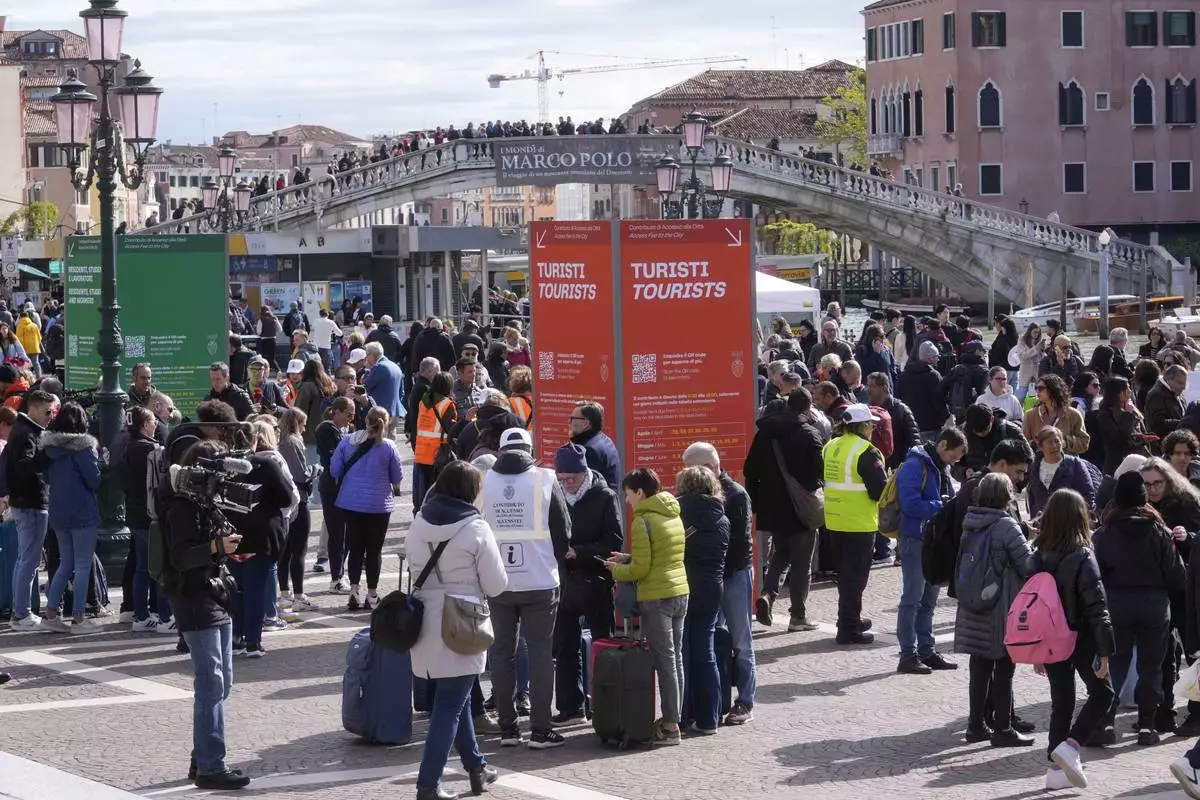
Stewards check tourists QR code access outside the main train station in Venice, Italy, Thursday, April 25, 2024. The fragile lagoon city of Venice begins a pilot program Thursday to charge daytrippers a 5 euro entry fee that authorities hope will discourage tourists from arriving on peak days. The daytripper tax is being tested on 29 days through July, mostly weekends and holidays starting with Italy's Liberation Day holiday Thursday. Officials expect some 10,000 people will pay the fee to access the city on the first day, downloading a QR code to prove their payment, while another 70,000 will receive exceptions, for example, because they work in Venice or live in the Veneto region. (AP Photo/Luca Bruno)
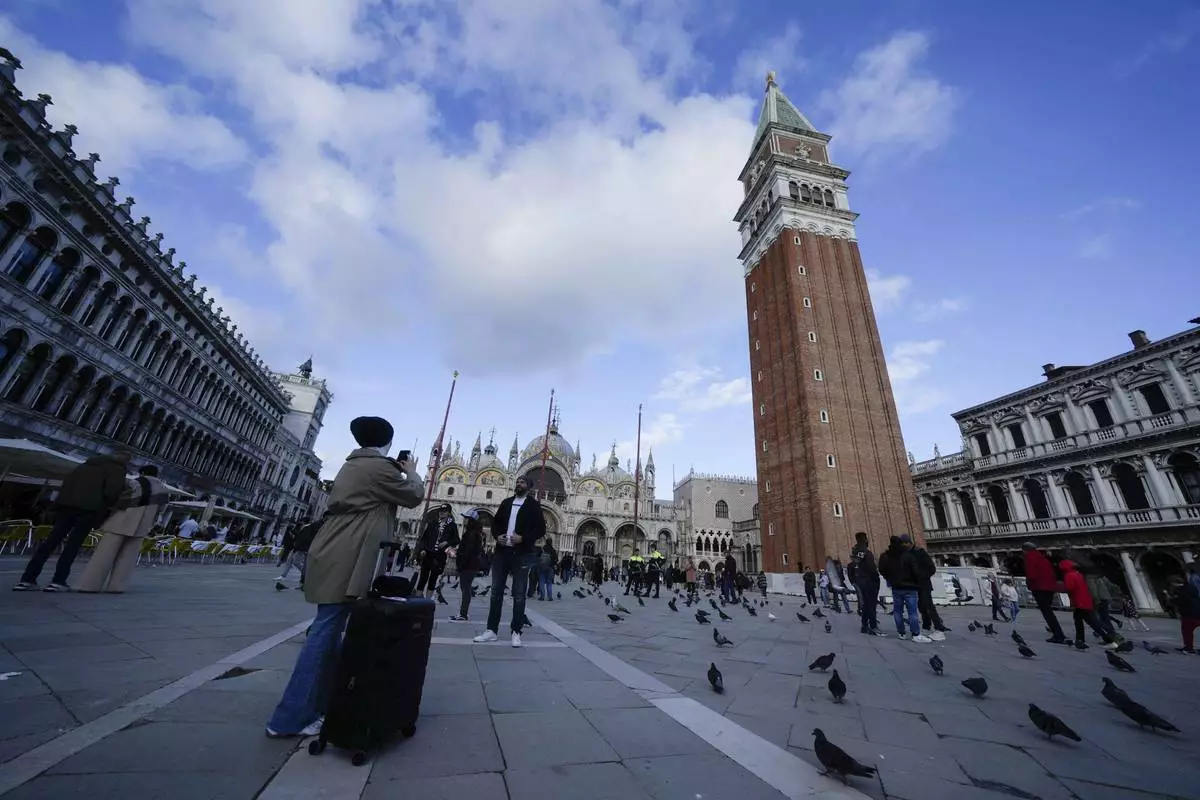
Tourists take pictures at the St. Mark square in Venice, Italy, Wednesday, April 24, 2024. The lagoon city of Venice begins a pilot program Thursday, April 25, 2024 to charge daytrippers a 5 euro entry fee that authorities hope will discourage tourists from arriving on peak days. Officials expect some 10,000 people will pay the fee to access the city on the first day, downloading a QR code to prove their payment. (AP Photo/Luca Bruno)
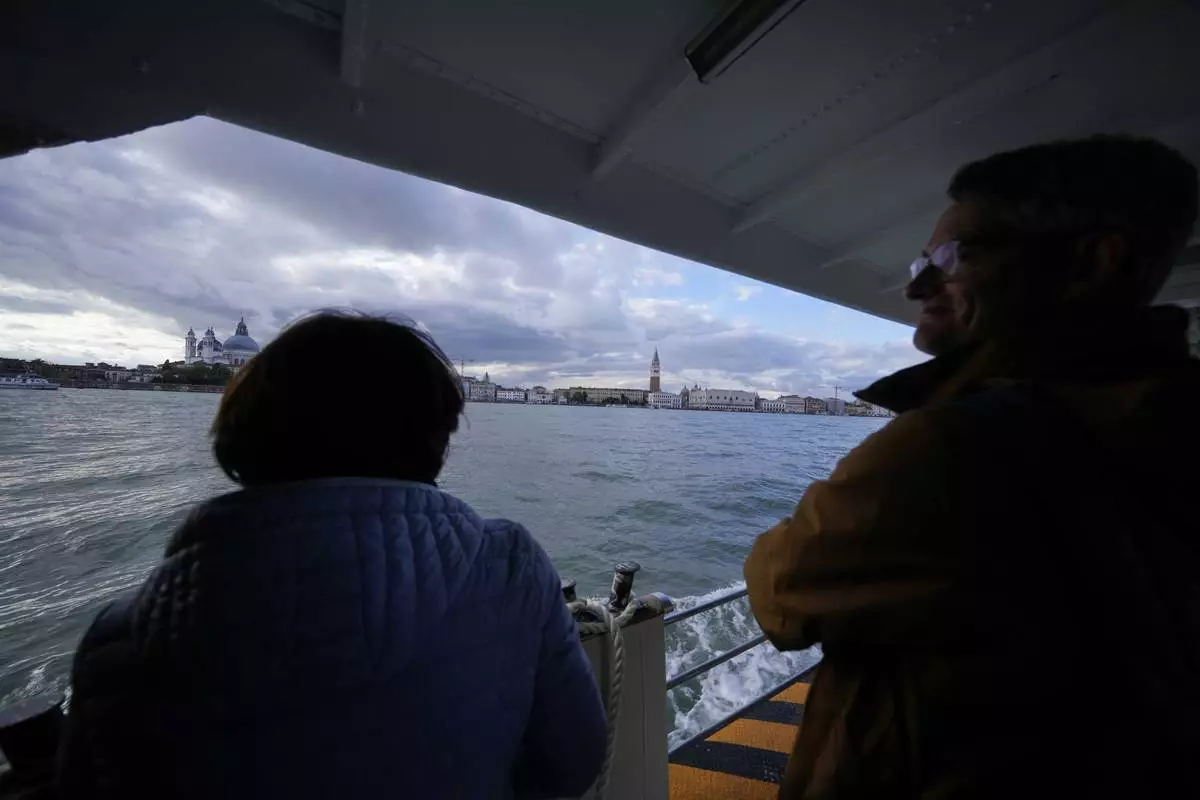
Tourists ride on a ferry boat in Venice, Italy, Wednesday, April 24, 2024. The lagoon city of Venice begins a pilot program Thursday, April 25, 2024 to charge daytrippers a 5 euro entry fee that authorities hope will discourage tourists from arriving on peak days. Officials expect some 10,000 people will pay the fee to access the city on the first day, downloading a QR code to prove their payment. (AP Photo/Luca Bruno)
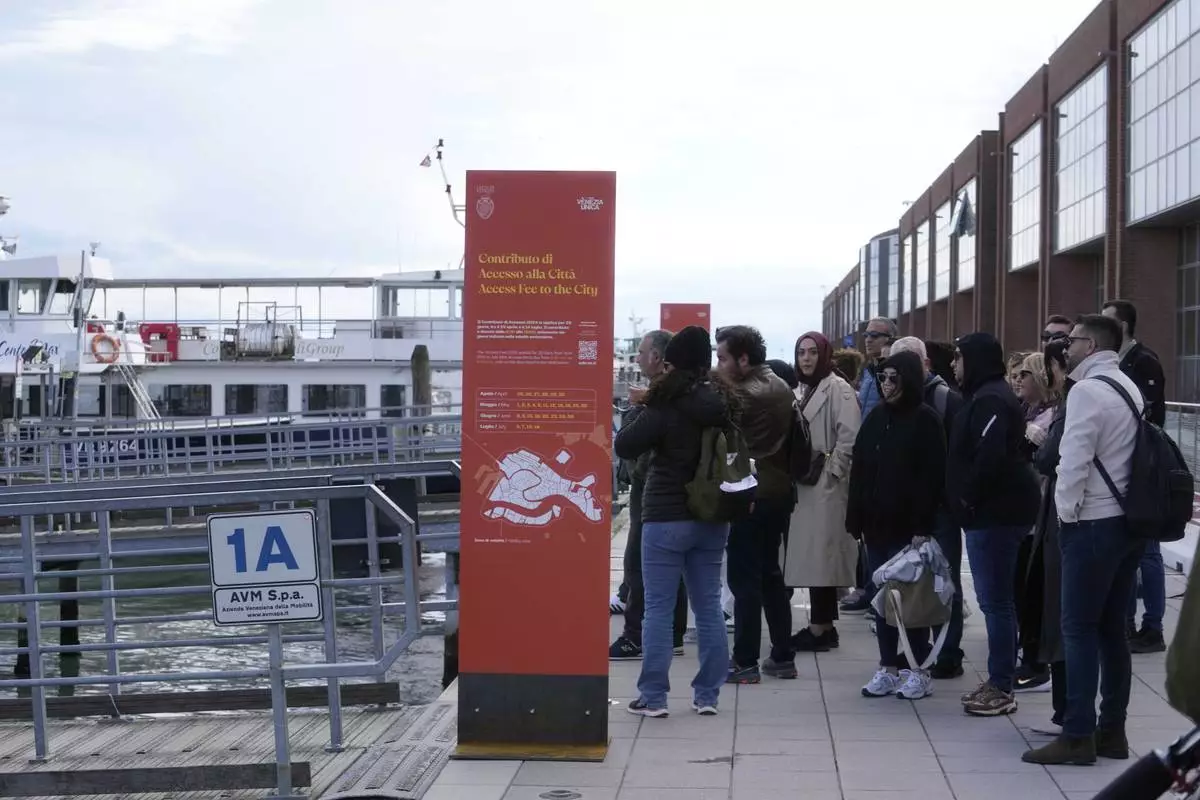
People stand in front of an information board explaining how to pay the tourist tax in Venice, Italy, Wednesday, April 24, 2024. The lagoon city of Venice begins a pilot program Thursday, April 25, 2024 to charge daytrippers a 5 euro entry fee that authorities hope will discourage tourists from arriving on peak days. Officials expect some 10,000 people will pay the fee to access the city on the first day, downloading a QR code to prove their payment. (AP Photo/Luca Bruno)
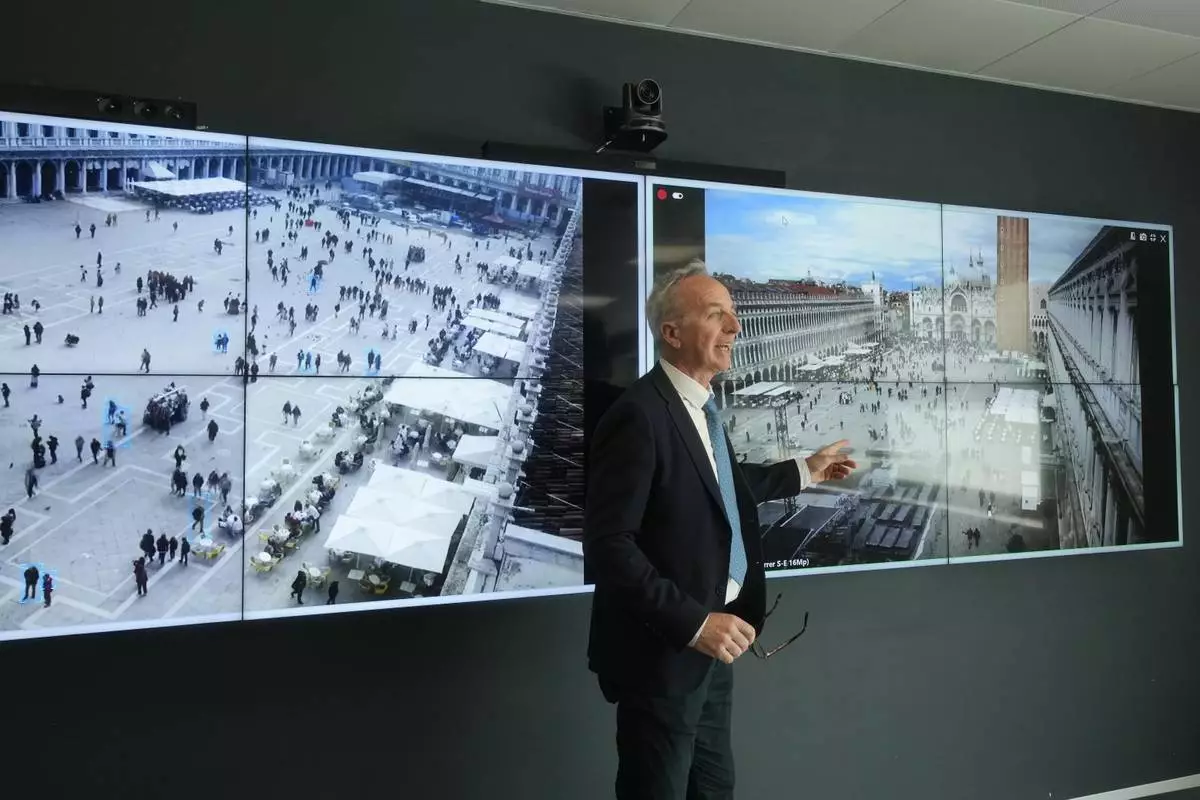
Marco Bettini, director of Venis Informatics System, gestures as he talks to reporters at the police Venice control room, in Venice, Italy, Wednesday, April 24, 2024. The lagoon city of Venice begins a pilot program Thursday, April 25, 2024 to charge daytrippers a 5 euro entry fee that authorities hope will discourage tourists from arriving on peak days. Officials expect some 10,000 people will pay the fee to access the city on the first day, downloading a QR code to prove their payment. (AP Photo/Luca Bruno)
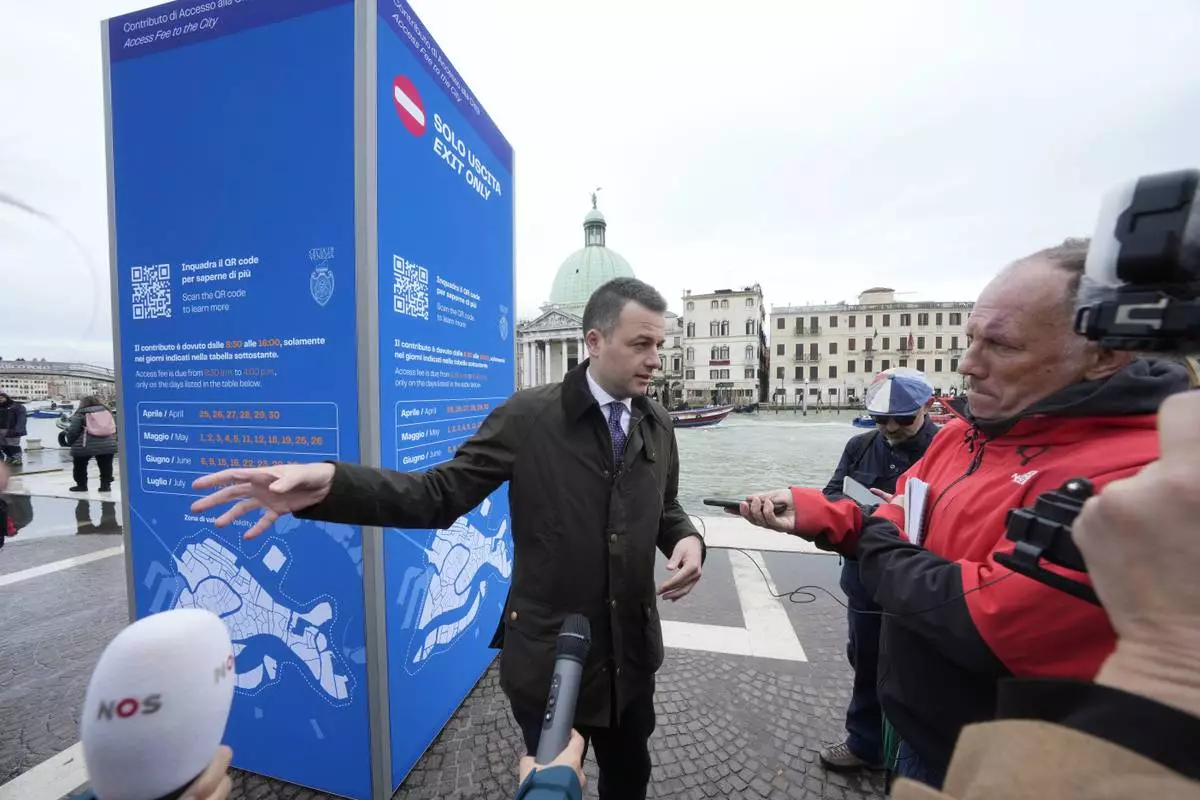
Venice councillor Simone Venturini speaks with reporters in front of a tourist tax totem in Venice, Italy, Wednesday, April 24, 2024. The lagoon city of Venice begins a pilot program Thursday, April 25, 2024 to charge daytrippers a 5 euro entry fee that authorities hope will discourage tourists from arriving on peak days. Officials expect some 10,000 people will pay the fee to access the city on the first day, downloading a QR code to prove their payment. (AP Photo/Luca Bruno)
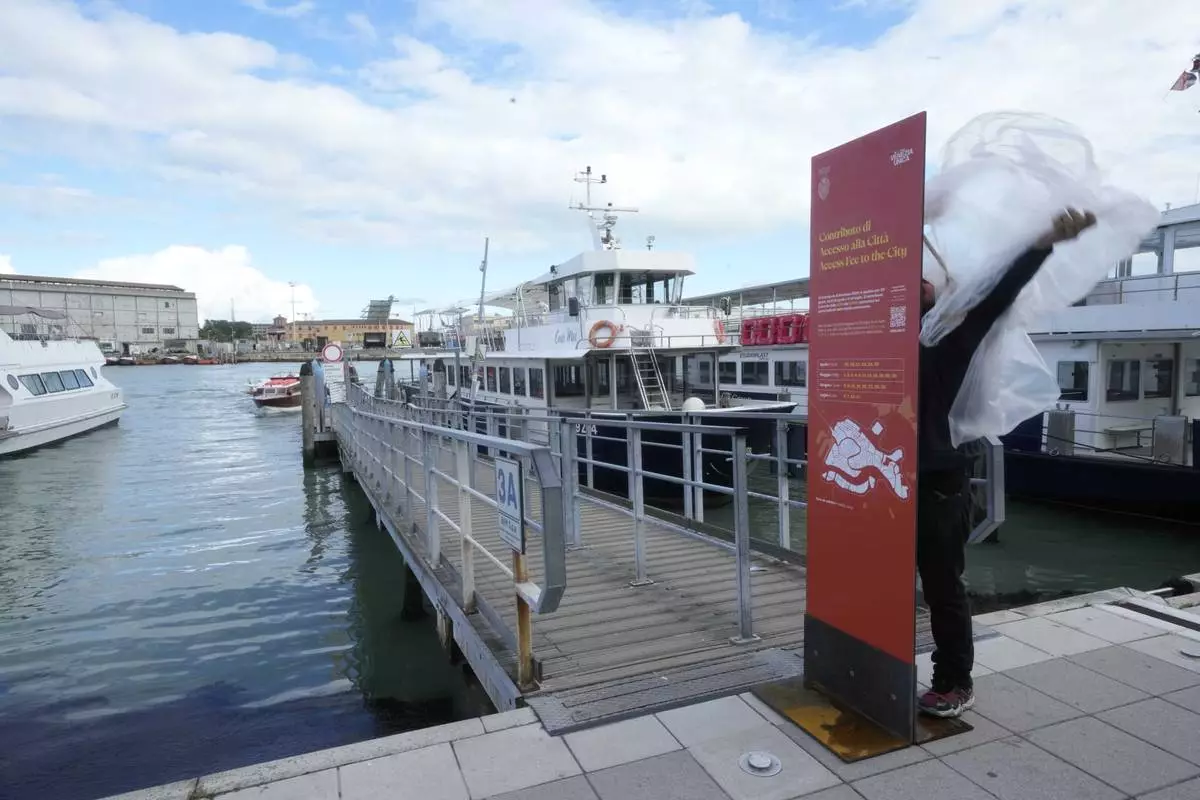
Workers prepare banner explaining how to pay the tourist tax in Venice, Italy, Wednesday, April 24, 2024. The lagoon city of Venice begins a pilot program Thursday, April 25, 2024 to charge daytrippers a 5 euro entry fee that authorities hope will discourage tourists from arriving on peak days. Officials expect some 10,000 people will pay the fee to access the city on the first day, downloading a QR code to prove their payment. (AP Photo/Luca Bruno)
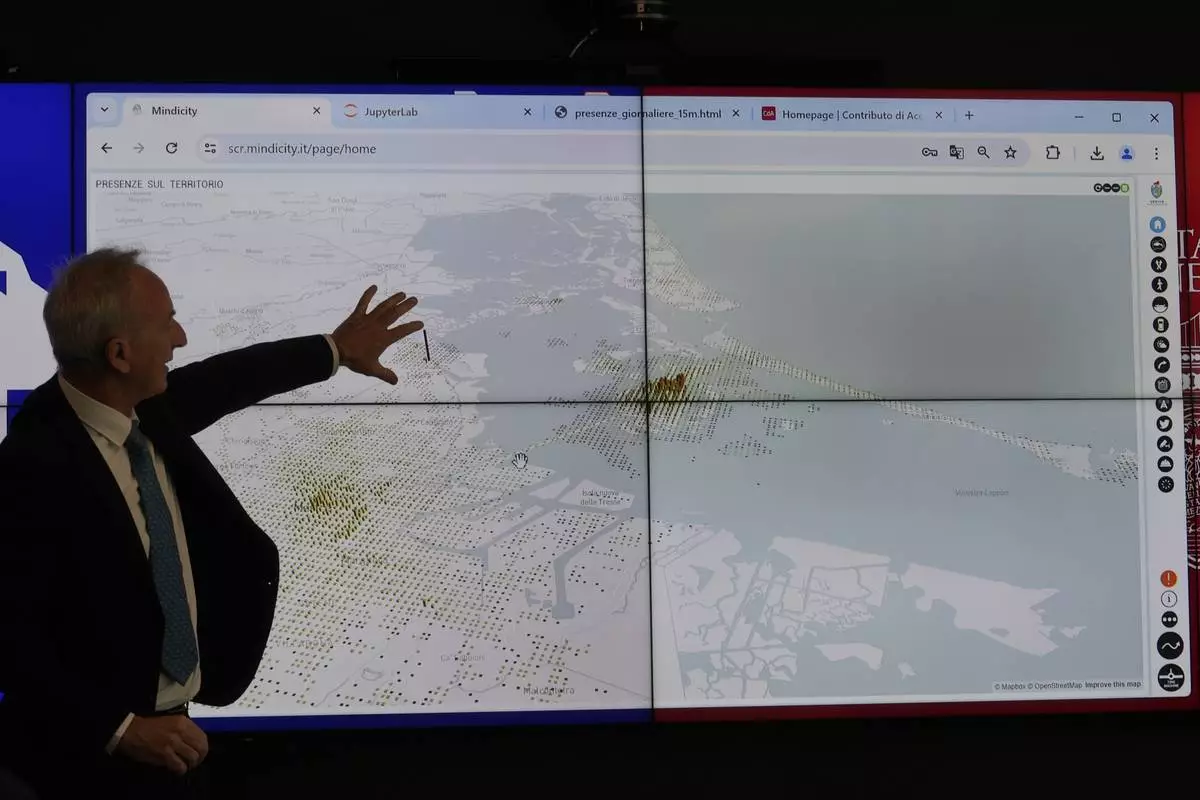
Marco Bettini, director of Venis Informatics System, gestures as he explains the Venice density to reporters at the police Venice control room in Venice, Italy, Wednesday, April 24, 2024. The lagoon city of Venice begins a pilot program Thursday, April 25, 2024 to charge daytrippers a 5 euro entry fee that authorities hope will discourage tourists from arriving on peak days. Officials expect some 10,000 people will pay the fee to access the city on the first day, downloading a QR code to prove their payment. (AP Photo/Luca Bruno)
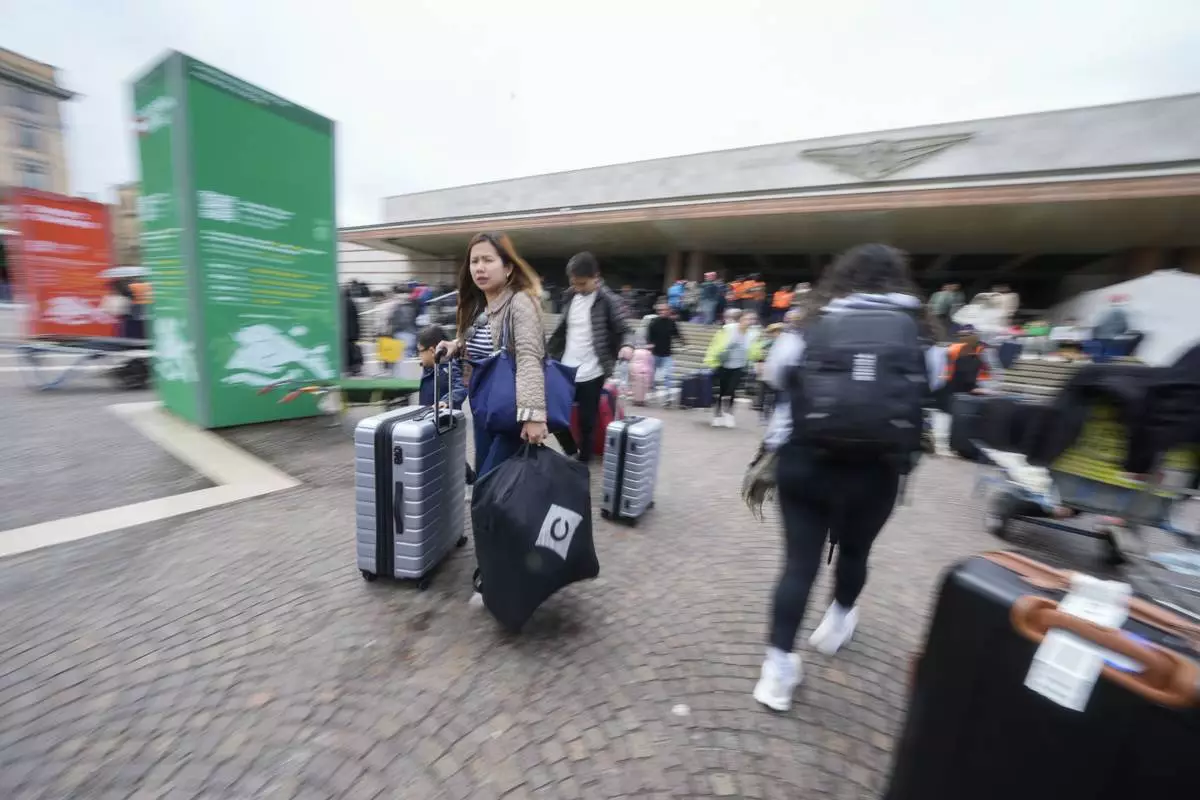
Tourists arrive at the main train station in Venice, Italy, Wednesday, April 24, 2024. The lagoon city of Venice begins a pilot program Thursday, April 25, 2024 to charge daytrippers a 5 euro entry fee that authorities hope will discourage tourists from arriving on peak days. Officials expect some 10,000 people will pay the fee to access the city on the first day, downloading a QR code to prove their payment. (AP Photo/Luca Bruno)
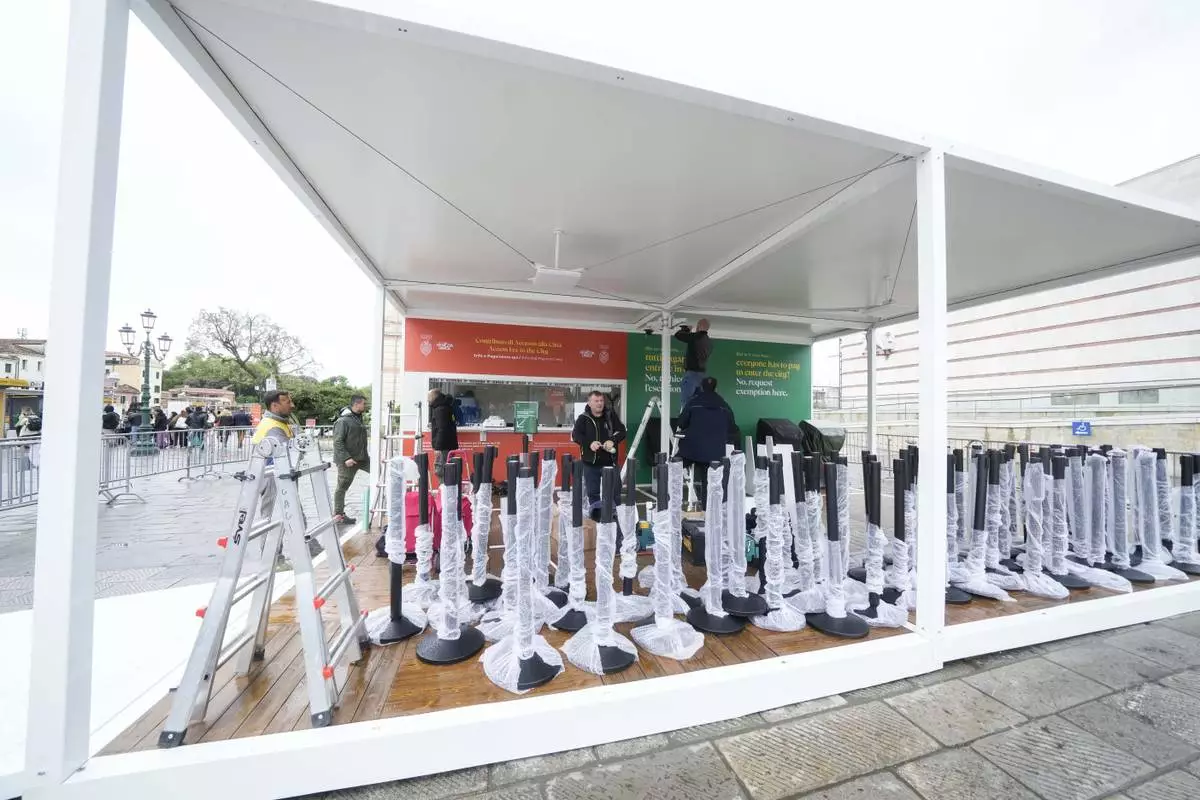
Workers prepare the tourist tax cashier desks outside the main train station in Venice, Italy, Wednesday, April 24, 2024. The lagoon city of Venice begins a pilot program Thursday, April 25, 2024 to charge daytrippers a 5 euro entry fee that authorities hope will discourage tourists from arriving on peak days. Officials expect some 10,000 people will pay the fee to access the city on the first day, downloading a QR code to prove their payment. (AP Photo/Luca Bruno)
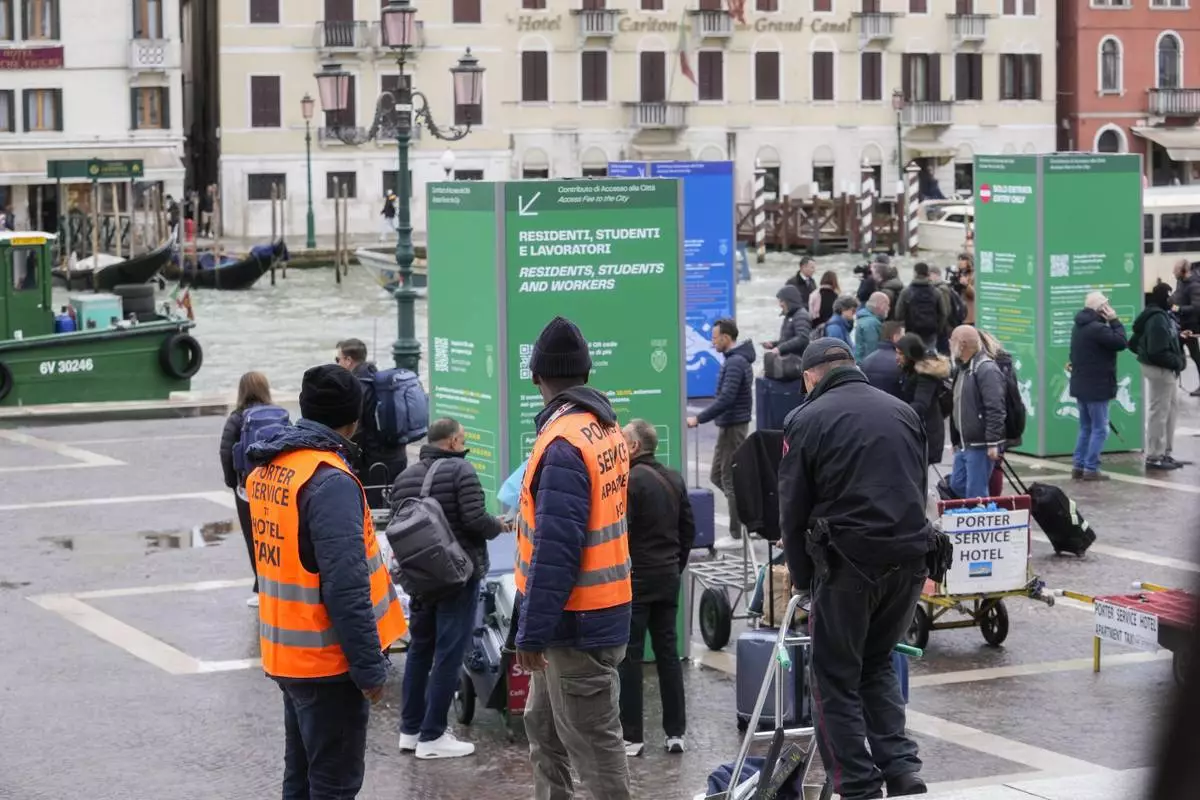
Porters wait for tourists outside the main train station in Venice, Italy, Wednesday, April 24, 2024. The lagoon city of Venice begins a pilot program Thursday, April 25, 2024 to charge daytrippers a 5 euro entry fee that authorities hope will discourage tourists from arriving on peak days. Officials expect some 10,000 people will pay the fee to access the city on the first day, downloading a QR code to prove their payment. (AP Photo/Luca Bruno)
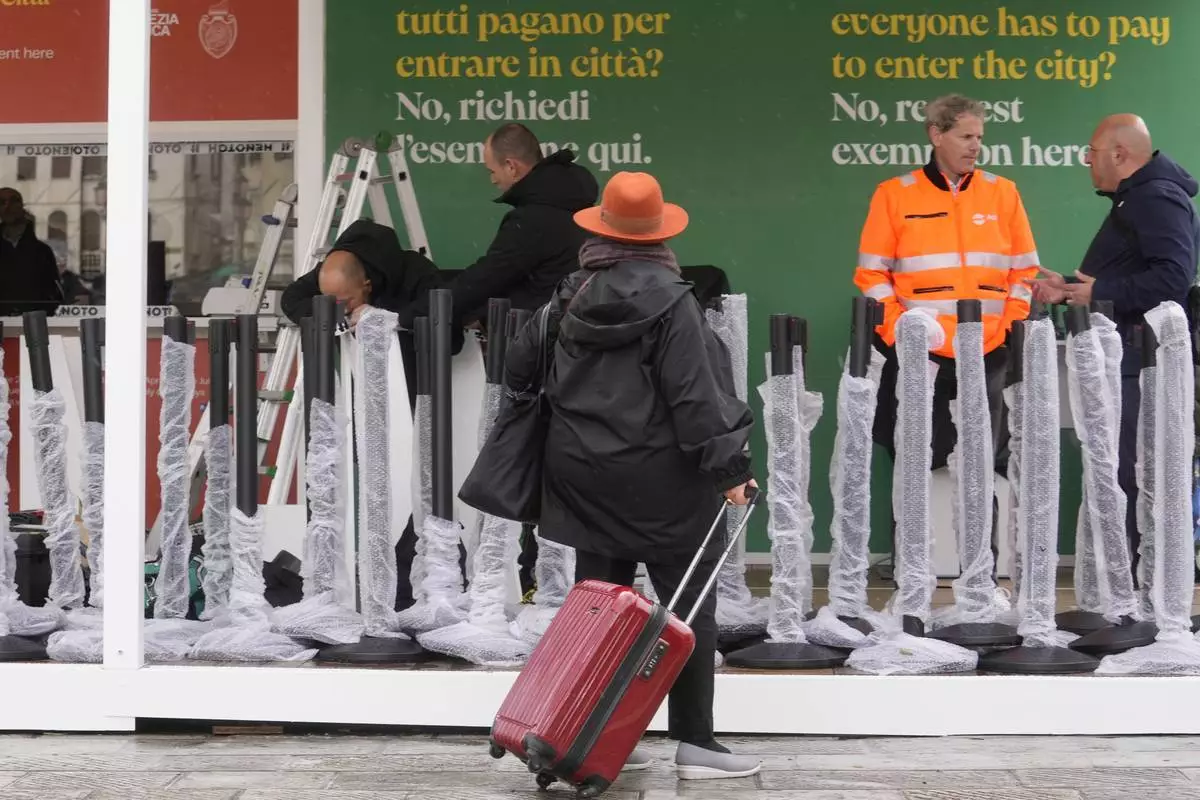
Workers prepare the tourist tax cashier desks outside the main train station in Venice, Italy, Wednesday, April 24, 2024. The lagoon city of Venice begins a pilot program Thursday, April 25, 2024 to charge daytrippers a 5 euro entry fee that authorities hope will discourage tourists from arriving on peak days. Officials expect some 10,000 people will pay the fee to access the city on the first day, downloading a QR code to prove their payment. (AP Photo/Luca Bruno)
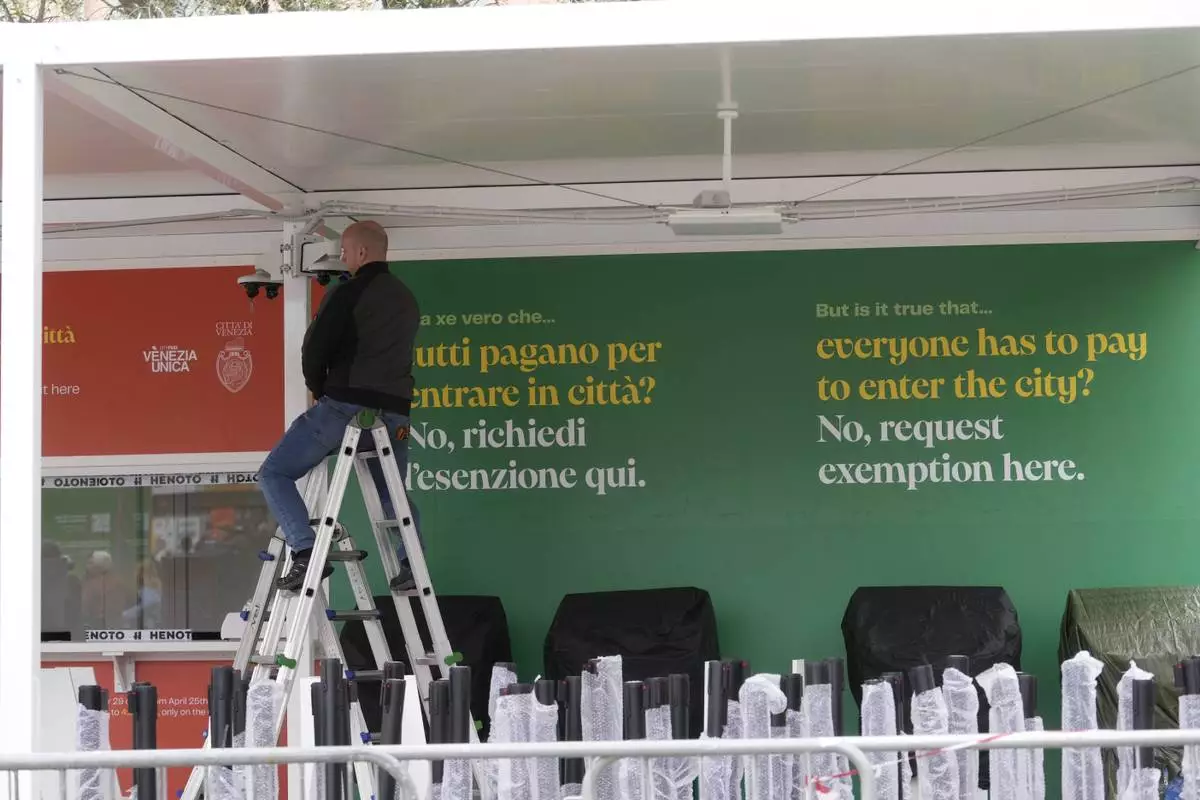
Workers prepare the tourist tax cashier desks outside the main train station in Venice, Italy, Wednesday, April 24, 2024. The lagoon city of Venice begins a pilot program Thursday, April 25, 2024 to charge daytrippers a 5 euro entry fee that authorities hope will discourage tourists from arriving on peak days. Officials expect some 10,000 people will pay the fee to access the city on the first day, downloading a QR code to prove their payment. (AP Photo/Luca Bruno)
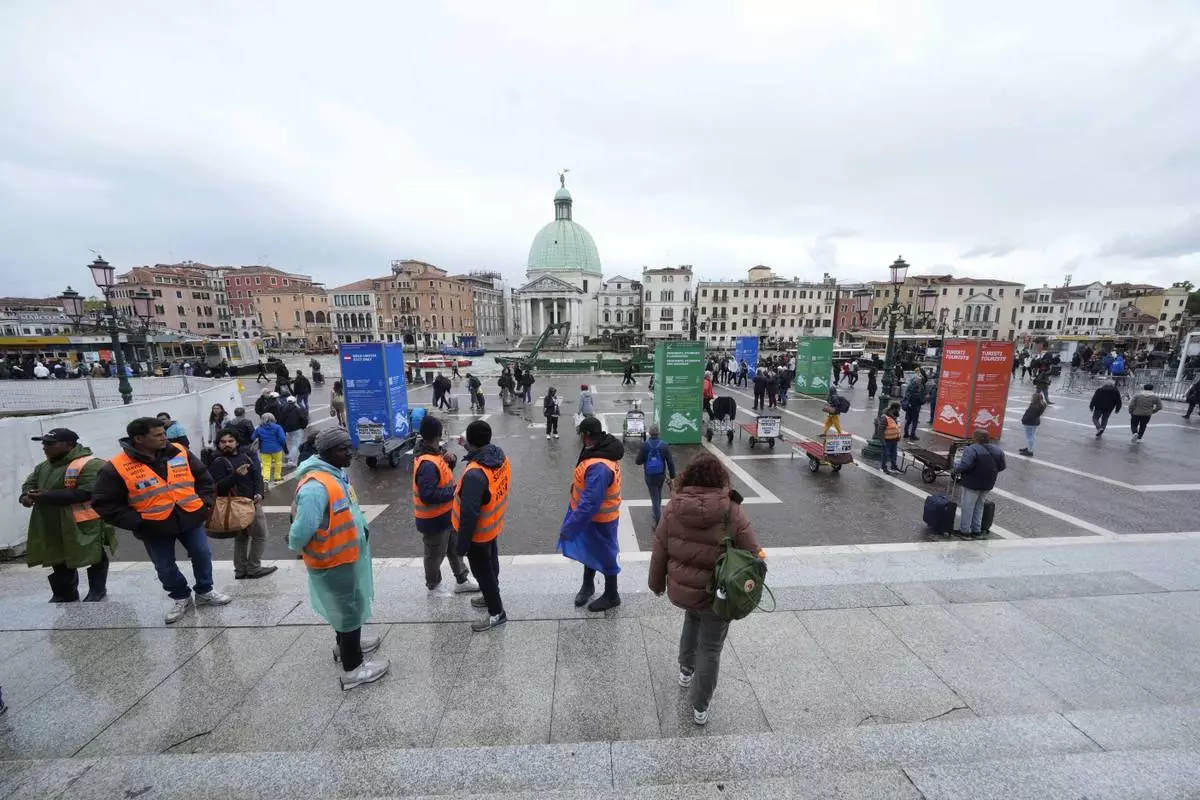
Porters wait for tourists outside the main train station in Venice, Italy, Wednesday, April 24, 2024. The lagoon city of Venice begins a pilot program Thursday, April 25, 2024 to charge daytrippers a 5 euro entry fee that authorities hope will discourage tourists from arriving on peak days. Officials expect some 10,000 people will pay the fee to access the city on the first day, downloading a QR code to prove their payment. (AP Photo/Luca Bruno)
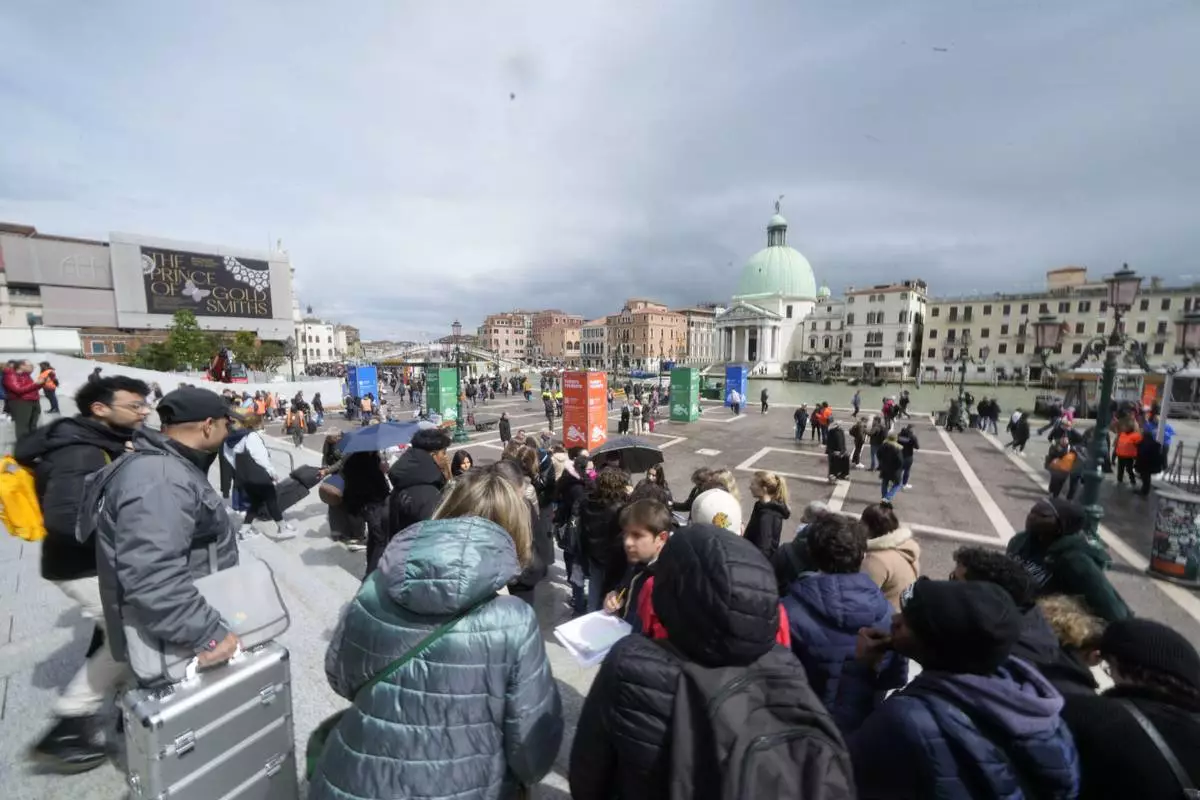
Tourists arrive outside the main train station in Venice, Italy, Wednesday, April 24, 2024. The lagoon city of Venice begins a pilot program Thursday, April 25, 2024 to charge daytrippers a 5 euro entry fee that authorities hope will discourage tourists from arriving on peak days. Officials expect some 10,000 people will pay the fee to access the city on the first day, downloading a QR code to prove their payment. (AP Photo/Luca Bruno)
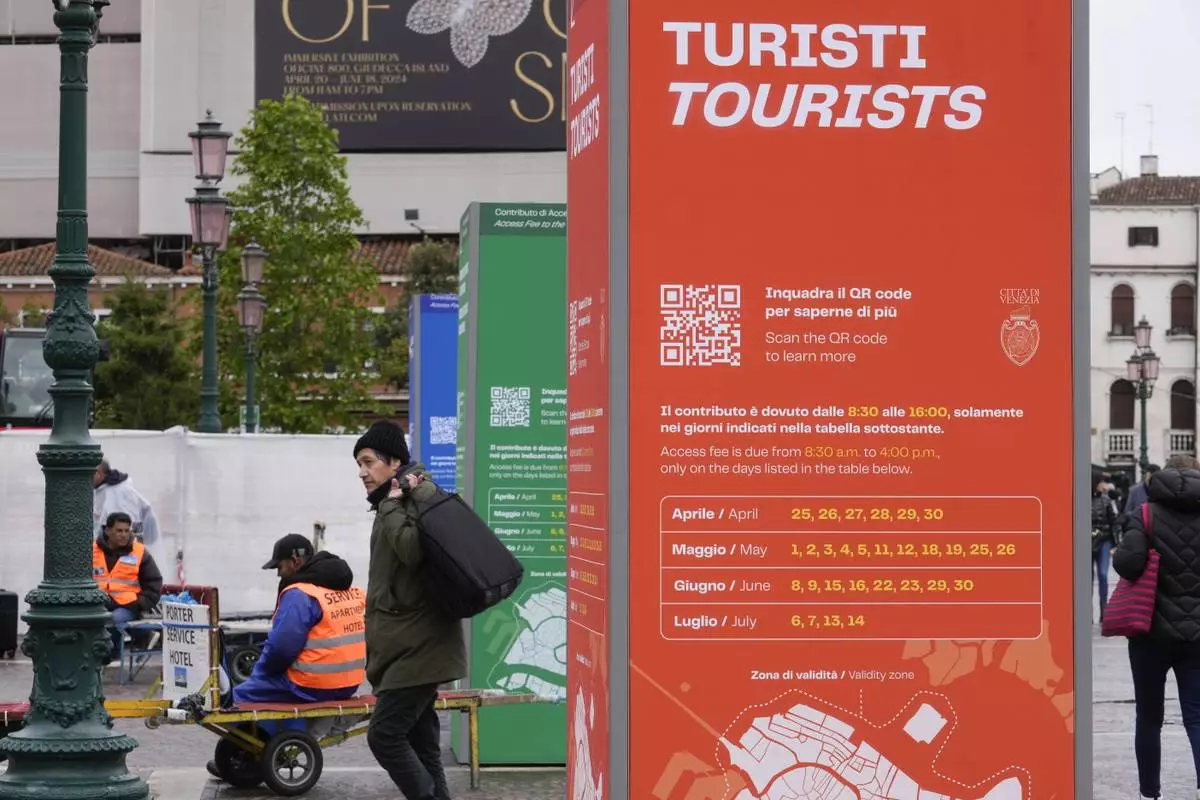
Tourist information boards are seen outside the main train station in Venice, Italy, Wednesday, April 24, 2024. The lagoon city of Venice begins a pilot program Thursday, April 25, 2024 to charge daytrippers a 5 euro entry fee that authorities hope will discourage tourists from arriving on peak days. Officials expect some 10,000 people will pay the fee to access the city on the first day, downloading a QR code to prove their payment. (AP Photo/Luca Bruno)
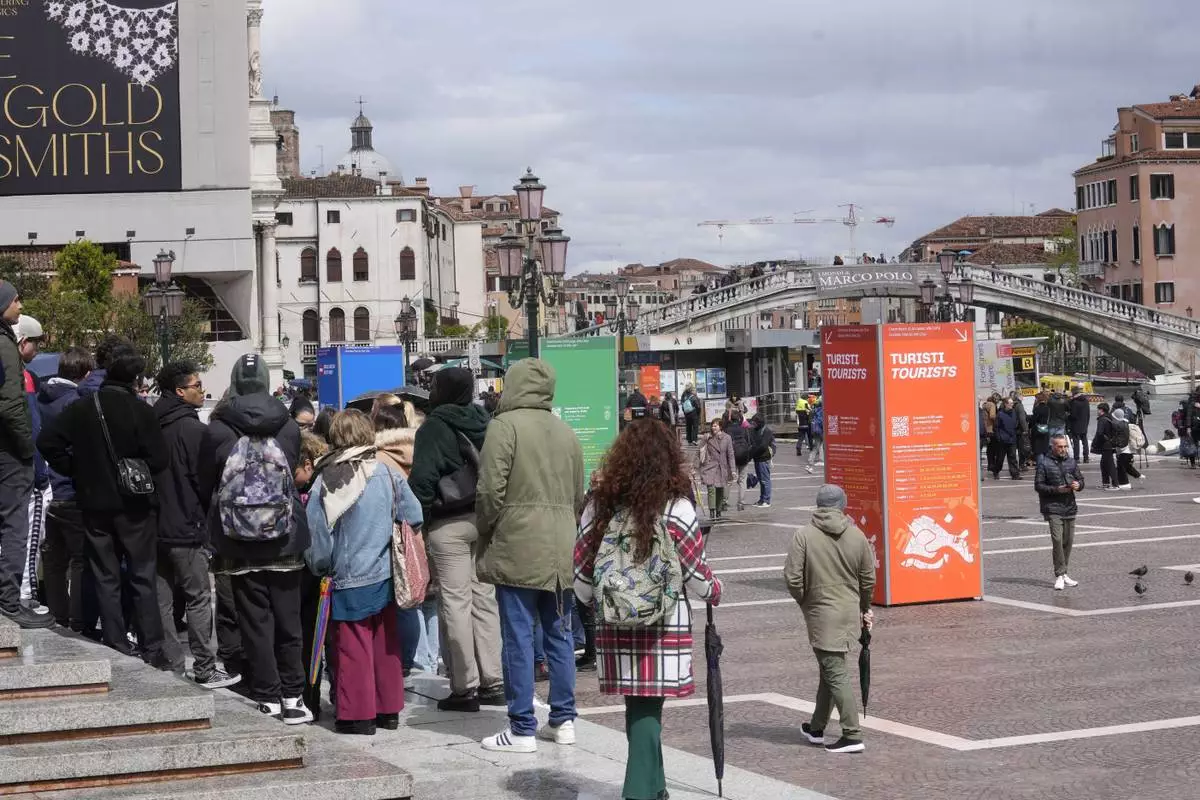
Tourists arrive outside the main train station in Venice, Italy, Wednesday, April 24, 2024. The lagoon city of Venice begins a pilot program Thursday, April 25, 2024 to charge daytrippers a 5 euro entry fee that authorities hope will discourage tourists from arriving on peak days. Officials expect some 10,000 people will pay the fee to access the city on the first day, downloading a QR code to prove their payment. (AP Photo/Luca Bruno)





































